Everything to Know About the SAG Strike and How It Will Affect TV and Movies
The Screen Actors Guild is officially on strike. Here's how the strike is affecting TV and movies such as House of Dragon and Deadpool 3
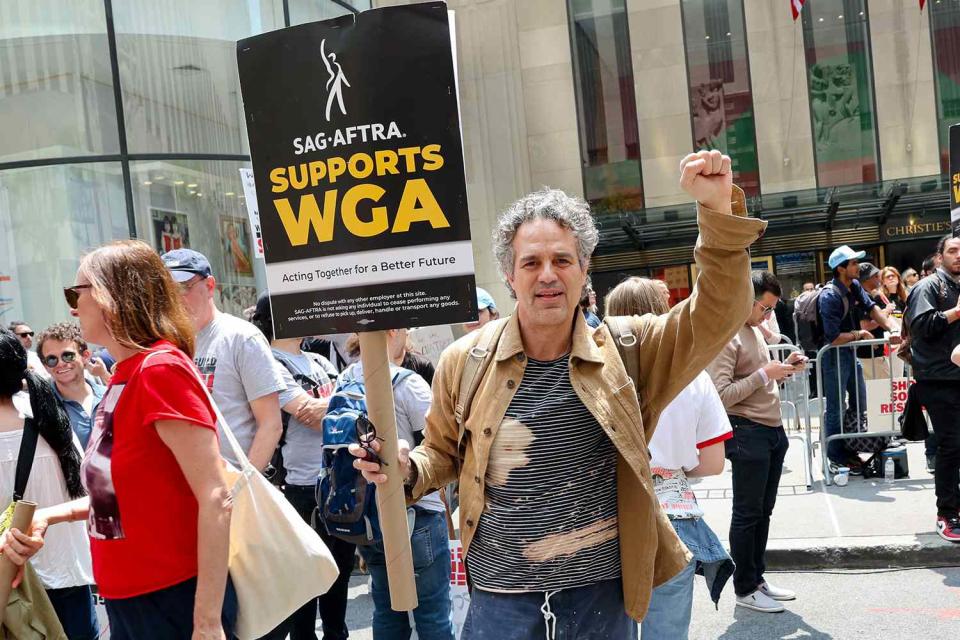
Jose Perez/Bauer-Griffin/GC Images
Hollywood is facing another strike.
Following the recent (and ongoing) Writers Guild of America (WGA) strike, which caused many TV and movie writers leave the writers’ room and head to the picket lines, the Screen Actors Guild is pushing for a new contract with the Alliance of Motion Picture and Television Producers (AMPTP).
On July 13, SAG-AFTRA — the union that comprises the Screen Actors Guild and the American Federation of Television and Radio Artists — announced it has initiated a strike after failed contract negotiations with the Alliance of Motion Picture and Television Producers.
SAG-AFTRA members previously voted 97.91% in favor of authorizing a strike on June 5 before it began negotiations with the AMPTP on June 7, though that vote did not immediately call for a strike.
Here’s everything to know about the SAG strike and how it could affect your favorite films and shows.
What is SAG-AFTRA?
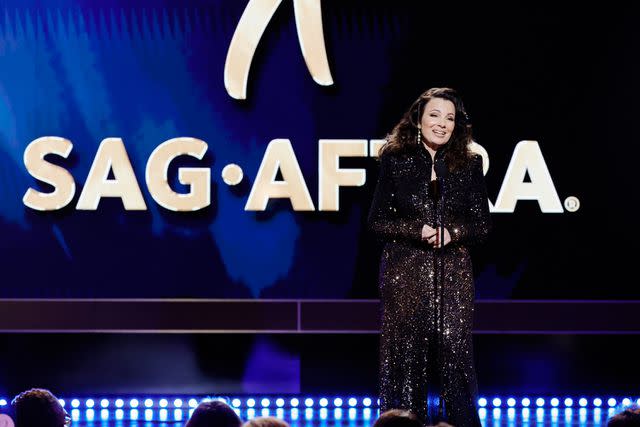
Kevin Winter/Getty
Formed in the 1930s, SAG-AFTRA “brings together two great American labor unions: Screen Actors Guild and the American Federation of Television and Radio Artists,” according the official SAG-AFTRA website.
The website adds that the SAG-AFTRA represents “approximately 160,000 actors, announcers, broadcast journalists, dancers, DJs, news writers, news editors, program hosts, puppeteers, recording artists, singers, stunt performers, voiceover artists and other media professionals.”
Per their mission statement, “SAG-AFTRA is committed to organizing all work done under our jurisdictions; negotiating the best wages, working conditions, and health and pension benefits; preserving and expanding members’ work opportunities; vigorously enforcing our contracts; and protecting members against unauthorized use of their work.”
What is the Alliance of Motion Picture and Television Producers (AMPTP)?
The Alliance of Motion Picture and Television Producers (AMPTP) represents the major Hollywood studios. Per their website, the AMPTP “has been the trade association responsible for negotiating virtually all industry-wide guild and union contracts, including those with American Federation of Musicians (AFM); Directors Guild of America (DGA); International Alliance of Theatrical Stage Employees (IATSE); International Brotherhood of Electrical Workers (IBEW); Laborers Local 724; Screen Actors Guild-American Federation of Television and Radio Artists (SAG-AFTRA); Teamsters, Local #399; and Writers Guild of America (WGA) among others.”
What are actors asking for in the new contract?
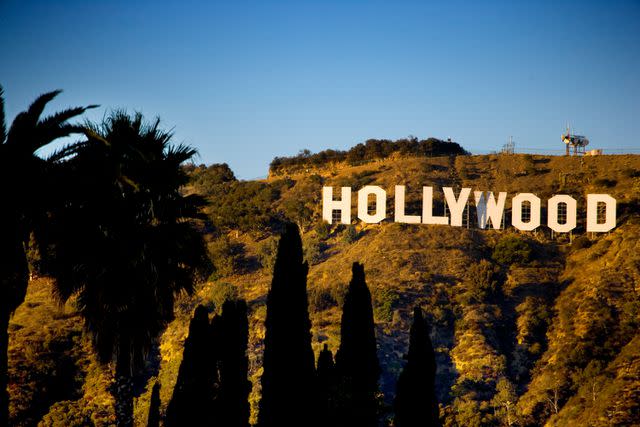
In Pictures Ltd./Corbis via Getty
Actors are seeking better compensation and benefit plans, as the rise of streaming services and complications resulting from the streaming model have contributed to a decline in wages and residuals. They also are looking for protections against the impact of AI on their work.
After SAG-AFTRA members voted 97.91% in favor of a strike authorization, SAG-AFTRA President Fran Drescher released a statement, saying, “Together we lock elbows and in unity we build a new contract that honors our contributions in this remarkable industry, reflects the new digital and streaming business model and brings ALL our concerns for protections and benefits into the now! Bravo SAG-AFTRA, we are in it to win it.”
How have actors taken action?

AFP via Getty GettyGetty
In June, various members of SAG-AFTRA wrote a letter to union leadership urging them not to settle with AMPTP if their demands are not fully met. They also threatened to strike should an agreement on a new contract not be resolved.
“We hope you’ve heard the message from us: This is an unprecedented inflection point in our industry, and what might be considered a good deal in any other years is simply not enough,” the letter stated, as reported Rolling Stone. “We feel that our wages, our craft, our creative freedom, and the power of our union have all been undermined in the last decade. We need to reverse those trajectories.”
The letter was signed by more than 300 actors, including Meryl Streep, Jennifer Lawrence, Rami Malek, Ben Stiller, Julia Louis-Dreyfus, Quinta Brunson, Amy Schumer and Amy Poehler.
Following SAG-AFTRA's official announcement that it was on strike against the film and TV companies, many actors took the picket lines on July 14, while others have shown their solidarity on social media, reposting SAG-AFTRA's official statement about the strike.
When did the SAG strike begin?
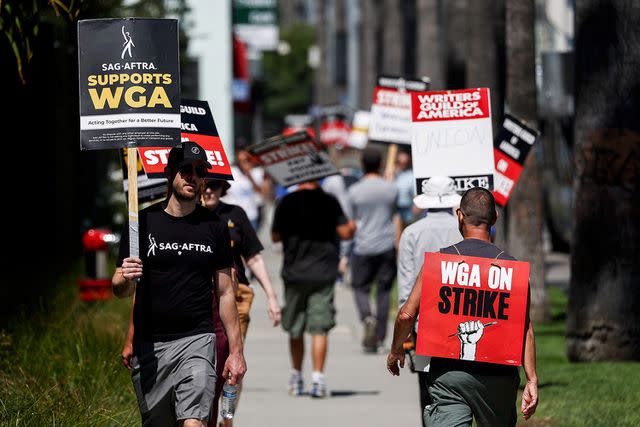
Mario Tama/Getty
SAG-AFTRA’s contract with the studios was set to expire on June 30 at midnight PT, but was later extended until July 7, Deadline reports. A negotiation between the union and studios was held on July 12 but failed to produce a new agreement, CNN reports.
On July 13, SAG-AFTRA announced it has initiated a strike after failed contract negotiations with the Alliance of Motion Picture and Television Producers. SAG President Fran Drescher and Duncan Crabtree-Ireland, National Executive Director and Chief Negotiator of SAG-AFTRA, shared the news at a press conference, noting it was a unanimous vote. The strike began at midnight with picketing starting at noon ET on July 14.
What has Alliance of Motion Picture and Television Producers (AMPTP) said about the SAG strike?
In a statement on July 13, the AMPTP said, according to ABC News, "We are deeply disappointed that SAG-AFTRA has decided to walk away from negotiations. This is the Union’s choice, not ours. In doing so, it has dismissed our offer of historic pay and residual increases, substantially higher caps on pension and health contributions, audition protections, shortened series option periods, a groundbreaking AI proposal that protects actors’ digital likenesses, and more."
"Rather than continuing to negotiate, SAG-AFTRA has put us on a course that will deepen the financial hardship for thousands who depend on the industry for their livelihoods. There are 160,000 members of SAG-AFTRA and over 11,000 members of the Writers Guild of America."
What shows and movies are being affected by the SAG strike?
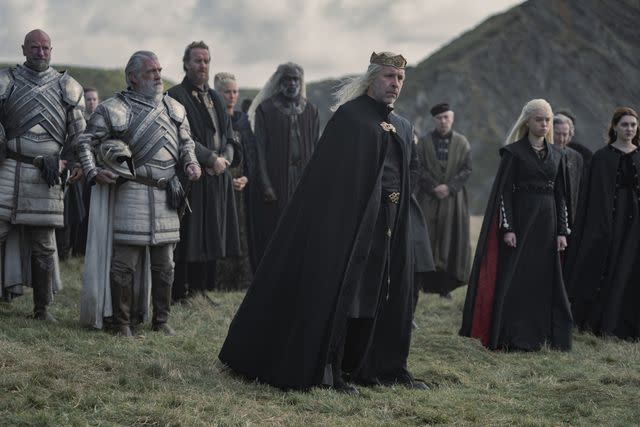
HBO
House of DragonsDeadpool 3 was one of the first major films to shut down production amid the SAG strike, while The Wrap anticipates that Beetlejuice 2, Gladiator 2 and Wicked could also be affected.
Amid the writers' strike, many shows had already paused production and will continue to be on hold indefinitely amid the SAG strike, including Stranger Things, Abbott Elementary and Cobra Kai.
There is a loophole for some shows filming overseas, however. PEOPLE has learned that the Game of Thrones prequel, House of the Dragon, will be allowed to continue shooting its upcoming second season as an Equity contract production. Since the cast is mostly comprised of actors who work under Equity, the sister union to SAG-AFTRA in the U.K., they are not advised to participate in the current strike. The same rule could apply to HBO’s Industry and Max’s Dune spinoff series Dune: The Sisterhood, which also operate under Equity rules.
What can’t actors do during the SAG strike?

Matt Winkelmeyer/GA/The Hollywood Reporter via Getty Images
In a memo signed by union president Fran Drescher and national executive director and chief negotiator Duncan Crabtree-Ireland, SAG-AFTRA members were ordered “to cease rendering all services and performing all work covered by the TV/Theatrical Contracts” once the strike begins.
According to the memo, that includes “principal on camera work,” such as acting, singing, dancing, performing stunts, piloting on-camera aircraft, puppeteering and performance capture or motion capture work. In other words, any work on TV shows and movies comes to a halt, shutting down production completely.
Off-camera work that is forbidden includes re-recording dialogue, voice acting, narration and stunt coordination.
Promoting new projects — including tours, personal appearances, and attendance at premieres and screenings — is also not allowed. Interviews are also off the table, as well as podcast appearances and promotion on social media.
Actors cannot appear at any conventions, fan expos or festivals in order to promote “any project that was made under the TV/theatrical agreement,” Crabtree-Ireland said at a press conference announcing the strike on July 13.
For more People news, make sure to sign up for our newsletter!
Read the original article on People.

